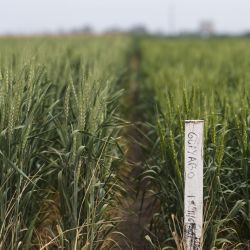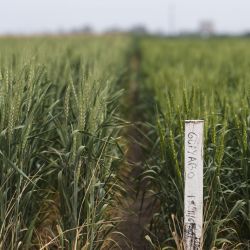Argentina, one of the world’s biggest food exporters, has become the first country to approve the marketing of transgenic wheat, a variant named HB4 which its creators consider a triumph of science but which faces the rejection of the markets, environmental activists and health professionals.
Developed by the biotech giant Bioceres, drought-resistant HB4 is the result of joint work between that private company, CONICET (Consejo Nacional de Investigaciones Científicas y Técnicas) researchers and a team at the Universidad Nacional del Litoral, headed by the scientist Raquel Chan.
"This technology is something which science and agricultural biotech have been trying to develop for the last 20 years. It’s a great honour for us to be the first to reach this market with a development of such importance related to the resilience of plants to climate change," Bioceres director Federico Trucco told AFP.
"HB4 technology’s tolerance to drought stems from a sunflower gene, a fairly plastic species which can withstand episodes of hydric stress with greater ease," explained Trucco in his lab just outside Rosario.
Argentina has been producing transgenic soy and maize for years, mainly used for animal feed and also for emulsifiers and sweeteners for human consumption, present in ultra-processed foods but in very small quantities.
This wheat will be the first time that a genetically modified seed is used to elaborate a food aimed totally at human consumption – the flour used to make bread or pasta.
"Whether or not it is harmless for the environment and human health is not up for discussion," maintains Trucco.
"In this case it’s a second-generation technology related to the efficient use of water," he points out.
Although Argentina’s food health authorities have approved its marketing, linked to the application of glufosinate-ammonium herbicides, the effective start of sales will depend on the endorsement of Brazil, Argentina’s leading wheat importer.
"When we see consumer opinions regarding a technology for preserving the environment, the position is very different than with first-generation transgenics," considers Trucco.
"This technology traps more carbon oxide and thus yields more during droughts. That permits us to increase productivity per hectare while taking pressure off native forests," justifies the director.
Markets reticent
In a statement, agricultural firms, producers, stock exchanges and Argentine bond markets criticised "the extraordinary economic risk" posed by HB4.
"The Argentine market has no experience in consuming transgenic wheat and the commercial domestic use of HB4 will have an impact on wheat pricing and supply in this country," they highlighted in a communiqué.
"The damage to the Argentine wheat market would be irreparable and irreversible, since the contamination [of non-transgenic wheat by this new variant] would spread and segmentation become unviable, thus jeopardising the joint [public/private] efforts to consolidate new markets and boost exports strongly," they explain.
Brazil’s Wheat Industry Association also expressed itself "against the use of this alternative source of food production."
Last year Argentina was the world’s ninth wheat producer with 19.5 million tons and fifth exporter with 11.3 million tons.
Concern for human health
Dr Damián Verzeñassi, director of the Social and Environmental Health Institute of Rosario National University, also warns of the potential effects on the health of neighbouring populations.
"In Argentina every approval of transgenics has increased the use of the associated herbicides, thus implying increased health problems for rural communities," Verzeñassi told AFP, also pointing out that H4B is resistant to penicillin-based antibiotics.
"Incorporating a resistant transgenic thus jeopardises the use of a very necessary antibiotic," he points out.
Transgenics are genetic modifications which are not natural plants but generated by man.
related news
by Jorgelina Hiba, AFP


























Comments